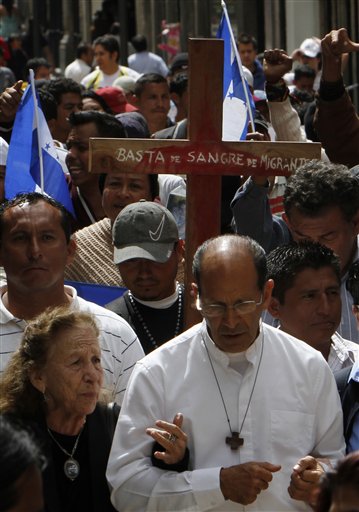Death threats force Mexican priest, migrant advocate to Chicago
By Steve Bynum

Death threats force Mexican priest, migrant advocate to Chicago
By Steve Bynum
Nota del Editor: Se incluye la versión en español de la entrevista del padre Solalinde.
Editor’s Note: Included is Spanish version of Father Solalinde’s interview.
I’ve spent time lately studying the final year of Dr. Martin Luther King, Jr.’s life. I find it sobering and inspiring to learn how King, like Mahatma Gandhi before him, reached a place of great inner-peace when confronted with death. Leading up to his murder on April 4th, 1968, King spoke to those close to him in a very macabre manner. He spoke with irony, humor, as well as intense seriousness about his coming demise.
I witnessed the same inner-light in Father Alejandro Solalinde when Worldview host Jerome McDonnell and I spoke to him after a recent interview (he spoke with us while he was in Chicago to speak before the National Latino Congress. We marveled at him. Over my many years with Worldview, I’ve encountered people who emit a certain light; I cannot call it anything else. In Father Alejandro’s case, Jerome called it “clarity.” We both sense that his time on this earth could be short.
Solalinde is a Catholic priest and social activist who works on behalf of Central and South American migrant workers. He fled Mexico to escape death threats he received from forces sympathetic to corrupt government officials and drug cartels who exploit migrants for drug trafficking and prostitution.
The outspoken Solalinde runs the Hermanos en el Camino (Brothers on the Road) migrant shelter in Oaxaca. He is part of a vast solidarity network that includes elements of Catholic Church hierarchy and laity, and a network of women known as “The Bosses,” who give migrants food and drink in small towns along the Mexican migrant trail.
Don’t let his humble looks fool you; he is a charismatic man who does not mince words or suffer fools. Many describe Solalinde as a voice crying for justice in the wilderness. In Father Solalinde’s view, his religious affiliations explain his passion for social justice: He cannot envision being an officer of the Catholic Church without advocating for migrant rights or social justice in general.
As was the case with Dr. King, we know there can be a cost when people stand against injustice and challenge the power structure with integrity and clarity: for their opponents, sometimes the cost of allowing them to live becomes too high. Father Solalinde names former Oaxacan Gov. Ulises Ruiz Ortiz as his main threat, but believes he lives in a cone of relative safety, at least for now:
I am alive not because the people who have been protecting me have been powerful, or because they are many. I haven’t been killed simply because in their own political calculations, [Ortiz’s forces] still believe that the consequences of getting rid of me would generate a huge political backlash, nationally and internationally. So it’s a simple math question. They believe the cost is too high to kill me.
Recently Solalinde announced to his enemies that he will return to Oaxaca to resume his work. He says he is prepared to die and has made peace with it:
On July 3rd, I will be back at the shelter where I belong. That’s where my ministry calls me to be. And I will be back. . .there regardless to whether there has been any change in my conditions of safety for me to be able to do what I believe Jesus has asked me to do.
Solalinde said he believes God demands this work not just from him, but from everyone.
Listen to Worldview Tuesday to hear our conversation with Father Solalinde.
Special thanks to Oscar Chacon from the National Alliance of Latin American and Caribbean Communities (NALACC) for interpreting Father Solalinde’s remarks.
English
español
